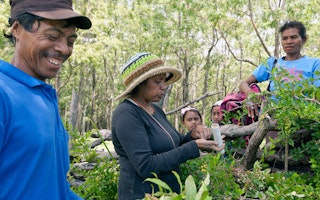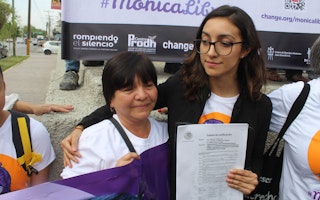A Travesty of Justice for Indigenous People in Mexico’s Prisons
By Tomas Lopez Sarabia

Carlota, a native speaker of Zapoteco who knows little Spanish, has been incarcerated since 2015, when she was arrested after being shown a search warrant she could not read or understand. Next, she was brought to the police station and asked to sign more documents. Then, days later, she was flown from her native Salina Cruz to Mexico City and asked to give a statement in Spanish—before signing yet more incomprehensible paperwork.
It was only at the end of this bizarre and nightmarish process that government agents finally read Carlota’s arrest warrant to her out loud and in a language she could understand. And that is how a 66-year-old grandmother from Oaxaca, Mexico, learned she had been charged with human trafficking.
Sadly, Carlota’s story is not unusual. Throughout Mexico today, around 6,500 indigenous people are behind bars. And many of these people faced language barriers that made a mockery of their right to a fair trial. Indeed, in recognition of this inherently unjust system, Mexico’s government decided to include indigenous inmates whose convictions came after inadequate interpretation as one of the groups allowed to apply for release under the country’s Amnesty Law.
Carlota maintains her innocence and has submitted her request for amnesty. Yet despite passing almost a full year ago, Mexico’s government has yet to release a single person through the Amnesty Law. Her submission is just one of the more than 1,000 that remain unaddressed.
Throughout our 15 years of operation, the Indigenous Legal Advice Center has documented numerous human rights violations that Indigenous people like Carlota have experienced within Mexico’s criminal justice system. We have found that Mexico’s judicial system lacks sufficient interpreters for indigenous languages. Just as troublingly, we have also found that intercultural awareness and sensitivity is not treated as a priority by many of the people who run these systems. Discrimination and racism run rampant.
In Oaxaca, for example, 60 percent of the indigenous population in prison had no access to an interpreter, according to AsiLegal, a civil society group in Mexico that provides legal assistance to vulnerable populations behind bars. Of those who did have access, a whopping 46 percent said they still did not understand the information they were being given. According to data from the Mexico National Institute for Statistics, Geographic and Information, meanwhile, 47 percent of indigenous people in Oaxaca’s prisons lacked a defender’s assistance at the time of their arrest. In some cases, they were not appointed a public defender until they were literally in front of a judge.
Because Mexico’s government does not provide reliable data, especially about vulnerable populations, we cannot be certain about the scale of the problem. But the data we do have, which has been collated through the hard work of civil society groups in Mexico, has made it all too clear that justice is not being done.
However, there is at least one aspect of a solution that is clear already: It is time for Mexico’s government to faithfully apply the Amnesty Law it passed in 2020.
Doing so would represent a first effort to compensate indigenous people for their mistreatment by Mexico’s discriminatory criminal justice system. Moreover, to make the law work as intended, Mexico’s government should allocate funding to hire more interpreters, as well as bilingual public defenders and judges; design public reintegration policies; stop abusing preventive detention; and, above all else, observe international standards with regards to the rights of indigenous people and other vulnerable minorities.
Only then may people like Carlota see some semblance of justice, after suffering for so many years.
CEPIADET A.C. is a grantee of the Open Society Foundations.
Tomas Lopez Sarabia is the chairman of the board for CEPIADET A.C.


